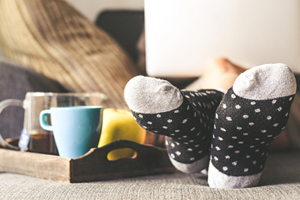
Once upon a time, "working from home" sounded like a dream for many office workers. The pandemic has made that dream, and its concomitant hardships, a reality. An entire population of new telecommuters now understands that working from home introduces
its own unique stressors into an already unbelievably stressful year.
- Let go of what you cannot control; focus on things you have the resources to manage.
- Keep a consistent routine as much as possible, especially regarding healthy sleep and exercise habits.
- Know the facts about the pandemic and how to keep yourself safe.
- Take breaks from the news cycle and social media to avoid fatigue and exhaustion.
- If you have kids, try to trade off parenting responsibilities, take breaks as a family, and use screen time strategically. (Get more tips here.)
- Maintain friendships and check on those who are isolated.
Check out AACRAO's free mental health webinar series
to connect with colleagues, learn coping strategies, and get specific guidance and reassurance that you are not alone.
5 steps for creating clear work-home boundaries
According to Nina Bartmann, Senior Behavioral Researcher, Center for Advanced Hindsight at Duke University, it's critical to create a clear distinction boundaries between work and home life, even when they occupy overlapping physical space.
Bartmann's 5-step process is as follows:
1.
Put your work materials aside. " At the end of the workday, take concrete steps to physically distance yourself from your work, even if that means just hiding it," Bartmann suggests. For example, close your laptop, close your office
door, and turn off your work email notifications.
2. Change your clothes. " Regardless of what you have been wearing during the day, your clothes will remind you of work," she writes. "By putting on something else, your new outfit will be associated with your new priority: your personal
life. Change into something comfortable, put on your shoes and jacket, and head outside."
3.
Go outside. No matter what you do, try to spend at least 30 minutes outdoors. Walk, bike, take pictures — anything you enjoy, away from your home.
"I have discovered a new joy for audiobooks while running, but on rainy days, for example, I prefer to take a walk around the neighborhood while calling my grandmother on the phone," Bartmann writes. "[Y]our time outside, just like the commute,
provides you with the mental and physical separation from work."
4. Move your body.
Exercise helps improve your mental and physical health, and any amount of exercise is better than none at all.
5. Come home. " You are finally home! After time spent outside, you get to walk through that front door without having to worry about work," Bartmann writes. "Enjoy your evening!"